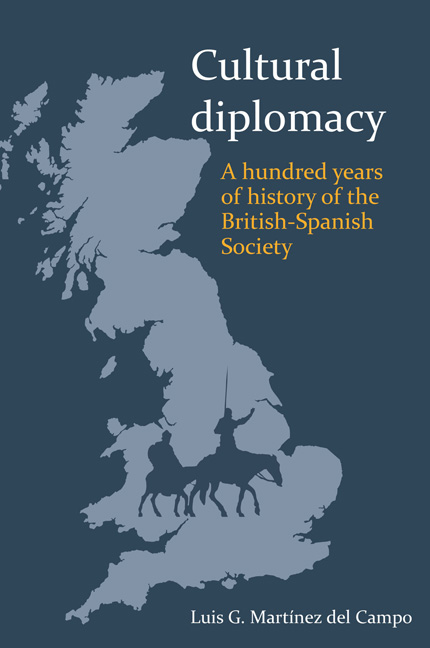Book contents
- Frontmatter
- Contents
- Joint Foreword
- Prologue
- English Edition
- Acknowledgements
- 1 Introduction
- 2 The foundation and expansion of the Anglo-Spanish Society (1916–1920)
- 3 The Anglo-Spanish Society in the interwar period
- 4 The rebirth: The League of Friendship (1950–1958)
- 5 A return to the origins: The new Anglo-Spanish Society
- 6 The Anglo-Spanish Society and Spanish democracy
- 7 Epilogue
- 8 Appendix: Memories of a retired member of the Executive Council of the Society by John Scanlan
- VERSIÓN EN ESPAÑOL
- Nota del autor
- 1 Introducción
- 2 Nacimiento y expansión de la Anglo-Spanish Society (1916–1920)
- 3 La Anglo-Spanish Society en el periodo de entreguerras
- 4 La reorganización: La Liga de la Amistad (1950–1958)
- 5 De vuelta a su origen: La nueva Anglo-Spanish Society
- 6 La Anglo-Spanish Society y la democracia
- 7 Epílogo
- 8 Apéndice: Cuadro de Cargos
- Index – English
- Index – Spanish
3 - The Anglo-Spanish Society in the interwar period
- Frontmatter
- Contents
- Joint Foreword
- Prologue
- English Edition
- Acknowledgements
- 1 Introduction
- 2 The foundation and expansion of the Anglo-Spanish Society (1916–1920)
- 3 The Anglo-Spanish Society in the interwar period
- 4 The rebirth: The League of Friendship (1950–1958)
- 5 A return to the origins: The new Anglo-Spanish Society
- 6 The Anglo-Spanish Society and Spanish democracy
- 7 Epilogue
- 8 Appendix: Memories of a retired member of the Executive Council of the Society by John Scanlan
- VERSIÓN EN ESPAÑOL
- Nota del autor
- 1 Introducción
- 2 Nacimiento y expansión de la Anglo-Spanish Society (1916–1920)
- 3 La Anglo-Spanish Society en el periodo de entreguerras
- 4 La reorganización: La Liga de la Amistad (1950–1958)
- 5 De vuelta a su origen: La nueva Anglo-Spanish Society
- 6 La Anglo-Spanish Society y la democracia
- 7 Epílogo
- 8 Apéndice: Cuadro de Cargos
- Index – English
- Index – Spanish
Summary
The war was over and the intense interest dying, when an office was obtained, a Secretary appointed, and a systematic appeal for funds begun.
John MackayThe end of the Great War heralded a new stage in the history of the Anglo-Spanish Society, which definitively renounced its wartime aims, adapting its targets and hierarchical structure to peacetime conditions. Although the London headquarters and most of its provincial branches were already fully functioning in 1918, the interest of the British government and the support of different social sectors diminished in the post-war period. In some ways, the Foreign Office was more flexible in supervising the association, which had never fulfilled the propaganda objectives for which it had been created. Additionally, most of the organisers linked their participation in the Society to the war; they considered their involvement in the association as a form of patriotic service for their country in wartime, and consequently following the armistice many abandoned ship.
In early 1919, the main organiser of the Anglo-Spanish Society, Israel Gollancz, resigned from his post as honorary secretary and left the association. Another key member, Ronald Burrows, was unable to continue working for the institution, and had to cancel all his commitments due to a virulent illness, which he died from in 1920. During the war, both scholars had been in close contact with the Foreign Office and British Intelligence services. Burrows had been the Principal of King's College London, which had been put at Society's disposal. His death provoked a relative distancing between the Society and both of these institutions.
Although different members had criticised Mackay, he became a leading figure for the Society when Gollancz and Burrows were no longer linked to it. After some years, Merry del Val, who was the Honorary President of the Society, recognised Mackay's work in organising the association:
- Type
- Chapter
- Information
- Cultural DiplomacyA Hundred Years of the British-Spanish Society, pp. 36 - 51Publisher: Liverpool University PressPrint publication year: 2015

